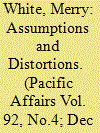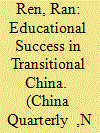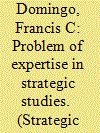| Srl | Item |
| 1 |
ID:
169213


|
|
|
|
|
| Summary/Abstract |
Ronald Dore’s work on education in Japan centred on themes of selection and equality. In his work on Tokugawa education, Dore presaged some of the emphasis he gave in his later work on quality and social and moral content in modern education. The argument of The Diploma Disease concerned the “late development effect” as a tool in understanding the emphasis on qualification and selection that led to Japan’s postwar examination hypertrophy, and in understanding the distortions and inequities that ensued. “Late ascription”—tracking and determining one’s life chances with a single examination—was one such distortion, narrowing the gate to educational and occupational success, belying the notion that Japan demonstrates a pure “meritocracy.”
|
|
|
|
|
|
|
|
|
|
|
|
|
|
|
|
| 2 |
ID:
189508


|
|
|
|
|
| Summary/Abstract |
Despite fruitful findings on the reasons underlying the desire for educational success and scarce credentials among students and families, there is little research on the meaning of educational success in the marketplace. As higher education in China has expanded to aid better-quality growth and the transition to a knowledge-based economy, educational success has become increasingly critical in the allocation of socioeconomic rewards. As such, insights into how educational success and concomitant credentials are valorized are empirically and theoretically significant. Drawing on in-depth interviews with 73 recruiters for elite professional service firms, this study analyses the meanings underlying the process of valorizing educational success and elite credentials. It shows that success in the gaokao, or entry to higher education, was qualitatively salient in excluding candidates, while information about subject domains and marks/class rank carried relatively less weight. Recruiters based the value of educational success on the notion of “learning ability,” which reflected their shared understandings about Chinese educational selection/institutions and wider conditions of elite professional firms. On this basis, this paper argues for the development of learning capital as a new theoretical lens for approaching educational success and credentials in transitional China.
|
|
|
|
|
|
|
|
|
|
|
|
|
|
|
|
| 3 |
ID:
140906


|
|
|
|
|
| Summary/Abstract |
Strategic geniuses are natural strategic thinkers even without much guidance. While the complexity of strategy makes it extremely difficult to formulate and execute, geniuses like Prussian General Carl von Clausewitz or Chinese General Sun Tzu were successful in developing strategies that are still relevant today. However, as strategic history suggests, military strategists do not need to be geniuses to succeed in creating decisive strategies.1 Strategists only need sufficient expertise to be able to outthink and outmanoeuvre their adversaries. Regrettably, strategic expertise has been elusive because existing strategic education and training has not provided the skills and knowledge that are necessary for developing the potential of future strategists. This problem is manifested by the clear absence of academic literature on strategic education and the unreliable performance of public officials.
|
|
|
|
|
|
|
|
|
|
|
|
|
|
|
|